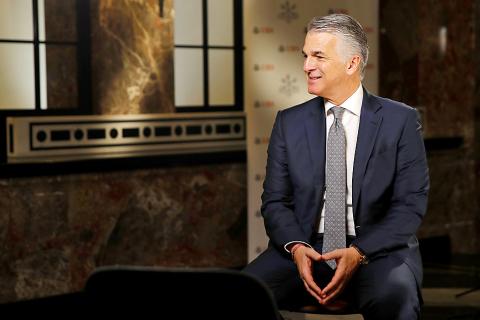UBS Group AG got a boost from rich Asian clients in a quarter hit by a poor result at the investment bank and lower income from lending as interest rates have languished.
The key wealth management unit added US$15.7 billion new money in the three months through last month, most of that from Asia, helping lift assets overseen for the affluent to a record US$2.5 trillion, UBS said yesterday.
While profit beat analysts’ estimates, UBS said it would book a charge of about US$100 million in the fourth quarter to restructure the securities unit, and warned that lower interest rates would continue to squeeze income.

Photo: Bloomberg
“Market conditions in the last few quarters have been very challenging,” chief executive officer Sergio Ermotti said in an interview with Bloomberg TV.
That is particularly true for the investment bank, which is “much more skewed towards Europe and Asia” than the US, he said.
Ermotti last month hired former Credit Suisse Group AG banker Iqbal Khan to co-run the wealth management unit, positioning him as a potential successor.
However, Khan’s start at UBS was overshadowed by a spying scandal that exposed a deep rift with his former boss.
UBS was one the first banks to pivot away from investment banking and toward wealth management after the financial crisis, becoming a model for rivals, including Credit Suisse.
Still, increasing competition for rich clients, negative interest rates and a slowing economy are putting pressure on that business.
Ermotti said he asked Khan to assess the wealth management franchise and, along with cohead Tom Naratil, report back to him with ideas to improve it by December.
Khan, in a memo to employees after he started this month, pointed to “unrealized potential” within the wealth management business.
Key will be his take on developing UBS’s offering to wealthy clients in Asia, a region that was not under his control at Credit Suisse and which attracted the bulk of the inflows last quarter.
Ermotti is also making changes to the investment bank, reshuffling senior management and combining trading operations in changes that might ultimately eliminate hundreds of positions, people with knowledge of the plan have said.
The bank is cutting about 40 jobs in the Asia-Pacific region as part of the shake-up, a person familiar with the matter has said.
The restructuring should save the bank about US$90 million annually, Ermotti said in an interview with Bloomberg TV, adding that job losses would not be significant.
Adjusted pretax profit at the unit fell 59 percent from a year earlier, as the bank earned less from advising on deals as well as from trading.
Equities trading revenue declined almost 7 percent, compared with a gain of about 1 percent at the five biggest Wall Street firms.
UBS is seeking to boost collaboration between dealmakers and its wealth-management unit, while sharpening a focus on industries most of interest to its richest clients.

To many, Tatu City on the outskirts of Nairobi looks like a success. The first city entirely built by a private company to be operational in east Africa, with about 25,000 people living and working there, it accounts for about two-thirds of all foreign investment in Kenya. Its low-tax status has attracted more than 100 businesses including Heineken, coffee brand Dormans, and the biggest call-center and cold-chain transport firms in the region. However, to some local politicians, Tatu City has looked more like a target for extortion. A parade of governors have demanded land worth millions of dollars in exchange

An Indonesian animated movie is smashing regional box office records and could be set for wider success as it prepares to open beyond the Southeast Asian archipelago’s silver screens. Jumbo — a film based on the adventures of main character, Don, a large orphaned Indonesian boy facing bullying at school — last month became the highest-grossing Southeast Asian animated film, raking in more than US$8 million. Released at the end of March to coincide with the Eid holidays after the Islamic fasting month of Ramadan, the movie has hit 8 million ticket sales, the third-highest in Indonesian cinema history, Film

BIG BUCKS: Chairman Wei is expected to receive NT$34.12 million on a proposed NT$5 cash dividend plan, while the National Development Fund would get NT$8.27 billion Taiwan Semiconductor Manufacturing Co (TSMC, 台積電), the world’s largest contract chipmaker, yesterday announced that its board of directors approved US$15.25 billion in capital appropriations for long-term expansion to meet growing demand. The funds are to be used for installing advanced technology and packaging capacity, expanding mature and specialty technology, and constructing fabs with facility systems, TSMC said in a statement. The board also approved a proposal to distribute a NT$5 cash dividend per share, based on first-quarter earnings per share of NT$13.94, it said. That surpasses the NT$4.50 dividend for the fourth quarter of last year. TSMC has said that while it is eager

‘IMMENSE SWAY’: The top 50 companies, based on market cap, shape everything from technology to consumer trends, advisory firm Visual Capitalist said Taiwan Semiconductor Manufacturing Co (TSMC, 台積電) was ranked the 10th-most valuable company globally this year, market information advisory firm Visual Capitalist said. TSMC sat on a market cap of about US$915 billion as of Monday last week, making it the 10th-most valuable company in the world and No. 1 in Asia, the publisher said in its “50 Most Valuable Companies in the World” list. Visual Capitalist described TSMC as the world’s largest dedicated semiconductor foundry operator that rolls out chips for major tech names such as US consumer electronics brand Apple Inc, and artificial intelligence (AI) chip designers Nvidia Corp and Advanced